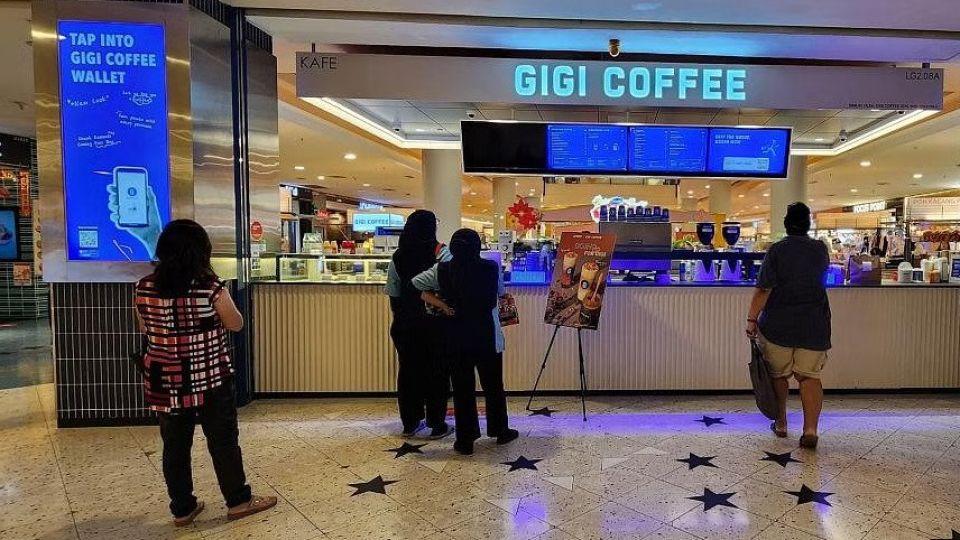February 5, 2024
KUALA LUMPUR – Malaysia’s home-grown coffee chains are in the spotlight after a nationwide call on social media to boycott international brands seen as supporting Israel in its war against Palestinian militant group Hamas.
With many in Muslim-majority Malaysia backing the Palestinian cause, there have been calls to support domestic brands instead. Local names that are making their mark in premium and speciality coffee and gaining in popularity include ZUS Coffee, Eight Ounce Coffee, Gigi Coffee, Richiamo Coffee, Bask Bear Coffee and Mukarami Coffee.
“I have shifted to Gigi or ZUS. I used to drink a lot of Starbucks coffee, my middle name was Starbucks,” said a 50-year-old housewife who wanted to be known only as Diana.
“My conscience feels better now,” she said.
Many consumers in Malaysia have been protesting via their wallets since the Israel-Hamas war began in October 2023. The broad boycott of consumer brands identified with the United States or seen as supporting Israel include coffee franchise Starbucks and food companies such as KFC, McDonald’s, Domino’s, Burger King and Nestle.
The Starbucks coffee chain took a hit from late 2023, facing a decline in traffic when it became one of the main targets of the boycott, after the American-based chain sued a labour union in the US state of Iowa over social media posts supporting Palestine. Starbucks outlets in Malaysia used to be packed to the brim but are now mostly quiet.
With over 400 stores across Malaysia, Starbucks is one of the biggest and most prominent coffee chains in the country.
“My local Starbucks used to be bustling with people. Now there are hardly any,” said business owner Ivy Simon, 45, adding that local coffee joints have seen a huge boom instead.
“The other day, we wanted to go to a local coffee shop for breakfast, but it was full,” she added.
Ms Rafizah Amran, owner-operator of Mukarami Coffee, said she has noticed a significant spike in sales since late November 2023.
“We believe it is a direct response to the ongoing Middle East conflict,” she told The Straits Times.
Mukarami Coffee has seen a 15 per cent to 20 per cent increase in daily sales across its outlets in Selangor state.
“This growth is remarkable, considering there were no major changes in our marketing strategy or menu offerings. It’s a clear indication that consumers are pivoting to local brands, reflecting their stance through their purchasing decisions,” Ms Rafizah added.
Mr Tan Boon Wy, chief executive and managing director of Wyld Group, which manages Eight Ounce Coffee, said the chain’s branches in Suria KLCC, The Gardens Mall and The Exchange TRX saw an 8 per cent rise in sales in December 2023.
“Our growth since the increase in sales has been steady,” he told ST.
Gigi Coffee’s group CEO, Mr Marcus Low, told ST that the chain has seen an uptick in sales, but did not provide figures.
“We have seen an improvement in our business in the last quarter. However, we are not able to attribute our improvement to any specific event or situation, such as the Israel-Hamas war, as many other factors contributed to our sales volume,” he said.
In December, research firm RHB Research said its ground checks of Starbucks outlets showed at least a 30 per cent fall in foot traffic. This was despite shopping centres being crowded and most of Starbucks’ competitors having regular footfall.
Ms Rafizah said: “Malaysia is an important and lucrative coffee market and the Middle East crisis has had a significant effect on local coffee brands such as ours.”
Malaysia recorded the third-highest spike in coffee consumption in the Asia-Pacific region in recent years, according to an International Coffee Organisation (ICO) report in April 2023.
South Korea and Australia were the top two countries ahead of Malaysia. The ICO is a United Nations body that aims to bolster the global coffee sector.
From 2020 to 2021, coffee consumption in Malaysia went up by 73 per cent, from 344,783 bags of coffee beans, weighing 60kg each, to 597,064 bags, the ICO added.
Data from Malaysia’s Statistics Department shows the average Malaysian consumed 2.2kg of coffee for the whole of 2022. The average Singaporean, meanwhile, consumed 2.6kg of coffee in 2021, according to the Perfect Daily Grind, a coffee news publication.
A 38-year-old, who works in communications and wanted to be known only as Dira, said she used to go to Starbucks often because of its many outlets, spending RM50 (S$14) to RM80 a week on coffee.
“I focus more on local brands these days or make my own,” she said.


